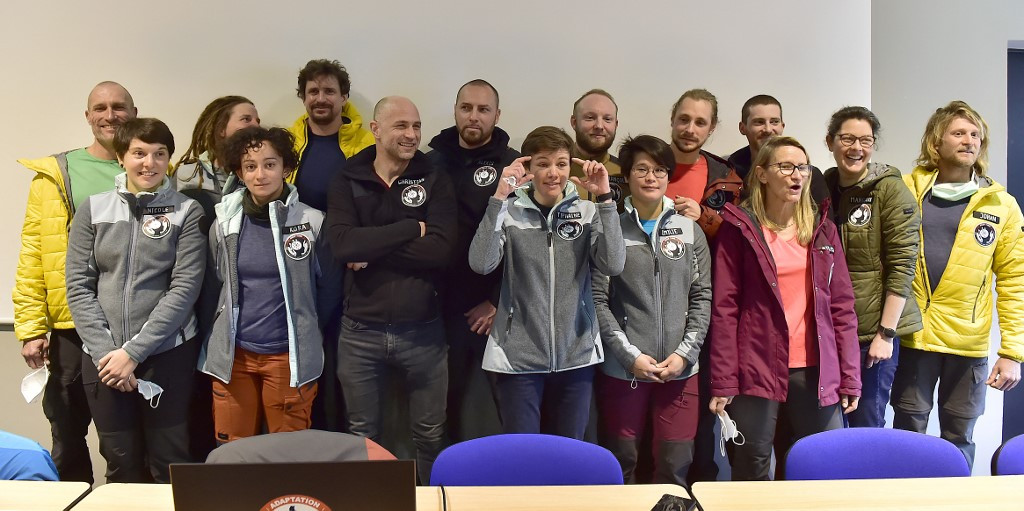Popular Reads
Top Results
Can't find what you're looking for?
View all search resultsPopular Reads
Top Results
Can't find what you're looking for?
View all search resultsNext-level lockdown: Six weeks underground in French cave
Change text size
Gift Premium Articles
to Anyone
 Swiss-French explorer-researcher Christian Clot poses with 14 volunteers before they spend together 40 days in a grotto as part of a scientific experiment at the Prehistory Park in Tarascon-sur-Ariege on March 14, 2021. Almost a year after the first lockdown in France, Christian Clot and 14 volunteers aged between 27 and 50 will live from March 14 in the Lombrives cave in Ariege for 40 days without seeing the light of day or having notion of time. (AFP/Georges Gobet)
Swiss-French explorer-researcher Christian Clot poses with 14 volunteers before they spend together 40 days in a grotto as part of a scientific experiment at the Prehistory Park in Tarascon-sur-Ariege on March 14, 2021. Almost a year after the first lockdown in France, Christian Clot and 14 volunteers aged between 27 and 50 will live from March 14 in the Lombrives cave in Ariege for 40 days without seeing the light of day or having notion of time. (AFP/Georges Gobet)
A
year after France entered uncharted territory with its first coronavirus lockdown, a small group of volunteers has embarked on a more extreme confinement: nearly six weeks underground, with no notion of time, to study the effects of acute isolation.
Since Sunday night, 15 men and women are living in the vast Lombrives cave in the Pyrenees mountains south of Toulouse for an experiment dubbed "Deep Time," led by the French-Swiss explorer Christian Clot.
For 40 days their home is a cavernous complex below the Earth's surface, deprived of phones, watches or natural light. But they do have their own tents for a minimum of privacy.
"Three separate living spaces have been set up: one for sleeping, one for living, and one for carrying out topography studies, in particular for fauna and flora," Clot told journalists a few hours before entering the cave.
The main subject of study, however, will be the seven men and seven women, aged 27 to 50, as well as Clot, who must adapt to a constant temperature of 12 degrees Celsius (54 Fahrenheit) and 95 percent humidity.
They have been fitted out with sensors to allow monitoring by around a dozen scientists hoping to learn how humans respond without the usual spatio-temporal frames of reference.
"This experiment is the first of its kind," said Etienne Koechlin, director of the cognitive neurosciences department at the Ecole Normale Superieur in Paris, who is part of the monitoring team.
"Until now, these types of missions aimed to study the body's physiological rhythms, but never the impact of this type of disconnection from time on a human being's cognitive and emotional functions," he said.
The volunteers, who are not receiving any compensation, are from all across France and include a jeweller, an anaesthesiologist, a security guard and a steeplejack.
Four tons of provisions and other equipment have been loaded into the cave so that the group can live in complete autonomy -- water will come from a well on site, and a bike-powered generator will provide electricity.
The bulk of the financing for the 1.2 million euro ($1.4 million) project came from Clot's Human Adaptation Institute, with the help of some private and public partnerships.
Arnaud Burel, a 29-year-old biologist, said he signed up "to experience this life removed from time, something that's impossible to do on the outside with our computers and cellphones that are constantly reminding us of our appointments and obligations."
"Forty days in your life, it's just a drop in the ocean, isn't it?" he said.
He nonetheless admitted that being cooped up with a small group might prove difficult.
"It's not easy to live with 14 people you don't know, in a closed space -- communication is going to be the key," he predicted.
Fortunately, the volunteers can leave at any time if the experience proves too much.










